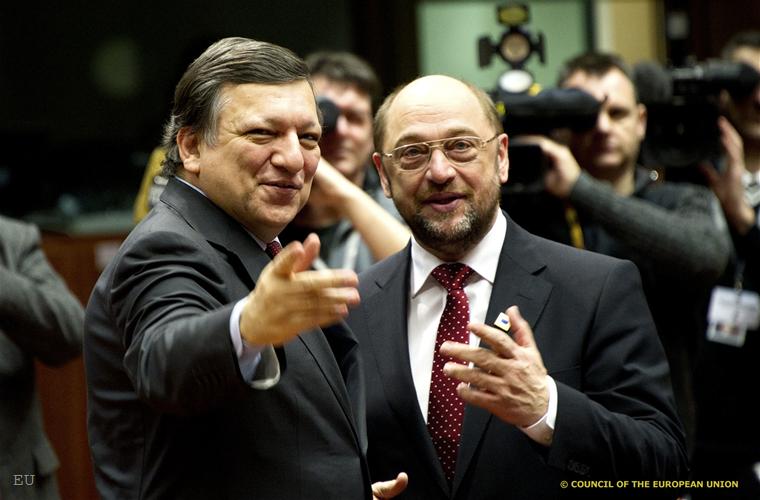The Fiscal Compact Takes Effect in Bulgaria with the Public Finance Act
Ralitsa Kovacheva, August 25, 2012
 The provisions of the Fiscal Compact, adopted by 25 EU countries this spring, are becoming part of Bulgaria's national legislation via the draft Public Finances Act (PFA) proposed by the Ministry of Finance. Apart from the Fiscal Compact, with this act the country meets the recommendations of the Council of EU finance ministers to improve the management of public finances, implements the directive on budgetary frameworks of Member States (part of the legislative package on the enhanced EU economic governance) and makes the national budgetary procedure consistent with terms and procedures provided in the mechanism for enhanced prior coordination of economic policies – the so called "European Semester". With the Public Finances Act national fiscal planning is becoming consistent with preventive and corrective arm of the Stability and Growth Pact, as stated in the draft`s motives.
The provisions of the Fiscal Compact, adopted by 25 EU countries this spring, are becoming part of Bulgaria's national legislation via the draft Public Finances Act (PFA) proposed by the Ministry of Finance. Apart from the Fiscal Compact, with this act the country meets the recommendations of the Council of EU finance ministers to improve the management of public finances, implements the directive on budgetary frameworks of Member States (part of the legislative package on the enhanced EU economic governance) and makes the national budgetary procedure consistent with terms and procedures provided in the mechanism for enhanced prior coordination of economic policies – the so called "European Semester". With the Public Finances Act national fiscal planning is becoming consistent with preventive and corrective arm of the Stability and Growth Pact, as stated in the draft`s motives.
The Fiscal Rules
In the second section of the PFA, the reference values for deficit and debt are enshrined as defined in the Protocol on the excessive deficit procedure to the Treaty on the Functioning of the European Union (TFEU) – a limit of 3% of GDP for the budget deficit and 60% for the ratio of government debt to GDP ("government" includes central government, regional or local government and social security funds). The PFA also contains literally the same rules as those enshrined in the Fiscal Compact which is part of the Treaty on Stability, Coordination and Governance in the Economic and Monetary Union.
Let me recall that Bulgaria has supported only this chapter of the treaty, while announcing that it would start applying the chapter on coordination of economic policies after joining the eurozone. The Treaty stipulates that the fiscal rules "shall take effect in the national law of the Contracting Parties at the latest one year after the entry into force of this Treaty through provisions of binding force and permanent character, preferably constitutional, or otherwise guaranteed to be fully respected and adhered to throughout the national budgetary processes."
Again under the Fiscal Compact, the draft PFA includes provisions for cases of deviations from the medium-term budgetary objective or the adjustment path towards it, as well as correction mechanism. Within six months after the PFA`s publishing in the State Gazette, the Council of Ministers shall submit to the National Assembly a concrete proposal for automatic correction mechanisms, as required by the Fiscal Compact.
Art. 37 of the PFA provides that the Act on the State Budget of the Republic of Bulgaria for the relevant year would set limits on the maximum amounts of new debt to be issued throughout the year, new governmental guarantees and public debt at the end of the year. The budget should also include "all investment projects and specific programmes approved by the Cabinet according to the Government Debt Law, which will be financed by government loans or state guaranteed loans," and debt payments are described as "a priority obligation of the state budget." According to the Fiscal Compact, debt issuance plans shall be reported ex-ante (in advance) to the Council of the European Union and to the European Commission.
Rules limiting deficits and debt also apply to municipalities. They must adhere to a balanced budget and the annual amount of municipal debt payments cannot exceed 15 percent of the average revenue (own and from the state subsidy) of a municipality for the last three years. So far, only the last year is taken into account and according to the Finance Ministry the changes "achieve a more realistic assessment of the financial position of the municipalities." The new fiscal rules also limit the scope of social security funds to incur debt and issue guarantees.
The budgetary procedure
In the first stage of the procedure the Ministry of Finance should prepare a medium-term budget outlook for the next three years and an updated Government Debt Management Strategy, which to be approved by the government by April 15th. The Minister of Finance prepares spring and autumn macroeconomic forecasts by 25 March and 25 September respectively. The Finance Ministry is required to compare its macroeconomic forecast with that of the European Commission and to justify any potential significant differences. The latest is obviously in response to criticism often addressed by Brussels to Sofia that Bulgaria prepares its basic programme documents based on too optimistic forecasts. The draft PFA explicitly says that the Convergence Programme, the National Reform Programme and the medium-term budget outlook should be developed under the same macroeconomic and fiscal forecasts and assumptions.
The medium-term budget outlook should contain some mandatory elements, as it is sent to Brussels and should provide sufficient clarity about the government's plans, on the one hand, and on the other, there should be a single standard for all Member States in order to ensure comparability. The medium-term budget outlook should describe the priorities of government policies and the fiscal policy objectives; present clearly its assumptions, including macroeconomic scenarios; contain enough information about the current state of the budget and forecast for major budget indicators for the next three years, etc.
Within the framework of the European Semester, the Bulgarian government`s programme documents must be submitted for approval to the European Commission and the Council of European finance ministers. Brussels` recommendations should be implemented and documents should be corrected. This obligation is even written in plain text in the draft PFA. The second stage of the budgetary procedure ends on 31 October with the introduction in the National Assembly of the State Budget Act, together with the updated medium-term budget outlook, which will serve as motives to the law.
Under the directive on budgetary frameworks, the Government is committed within six months after the PFA`s publishing in the State Gazette to submit to the National Assembly a proposal for an independent body to monitor compliance with the rules in preparing the budget, "based on reliable and independent analysis." This body, the so called fiscal council, should be independent from the fiscal authorities of the Member States, the Directive provides.
Scarce first reactions
The draft Public Finance Act has been published by the Ministry of Finance on 20 July for public consultations. A month later, the ministry has published the draft again, explaining that "the proposals of the budget organisations and NGO community have been discussed and the draft Act has been revised, as a number of proposals have been adopted." It's hard to say what were these proposals because the publicly expressed views on the subject were few and far between. Comparative reading of the two texts shows that there are no changes reflecting the expressed criticism.
For example, the Bulgarian Industrial Association believes that it is unclear how the municipalities will fulfil the requirements for zero balance and reducing costs, "At a time when we talk about strengthening local government, it is unclear how this can be achieved without sufficient funds and without a procedure providing for additional transfers from the central budget." Another criticism of the organisation is that "excessive freedom is given to the Minister of Finance and the Prime Minister to change the budgets of the institutions and to define terms, conditions, etc."
Surprisingly, we found no position on the PFA on the website of the National Association of Municipalities in Bulgaria, although individual members of the association spoke against it on the grounds that it penalises municipalities and centralises the budgetary procedure. The draft, however, obliges the Minister of Finance to conform to the Association of Municipalities "the level of budgetary relations between the central budget and local budgets in the medium-term budget outlook."
In February 2012, the Institute for Market Economics (IME) has published the report "Fiscal Rules: Literature Review, Implementation and Implications for Bulgaria", where some reasonable question have been raised: does Bulgaria need fiscal rules for municipal budgets; will the introduction of automatic correction mechanisms help and if so, how to structure them; is a Fiscal Council needed for Bulgaria and if so, how to guarantee its independence and boost its reputation?
We can expect answers to the last two questions half a year after the PFA is published in the State Gazette. However, it is yet to be passed by the National Assembly. The European fiscal rules will hardly provoke serious disputes, except the usual criticism by the Socialist according to their party line. As for municipalities, however, we can expect not just different positions to collide but the draft PFA to be changed, under pressure from the local authorities and in light of the upcoming parliamentary elections in July 2013. We can clearly feel that elections are forthcoming also from the last sentence in the draft PFA: "This Act shall enter into force on 1 January 2014."
 | © EU
| © EU | © EU
| © EU | © www.parliament.bg
| © www.parliament.bg